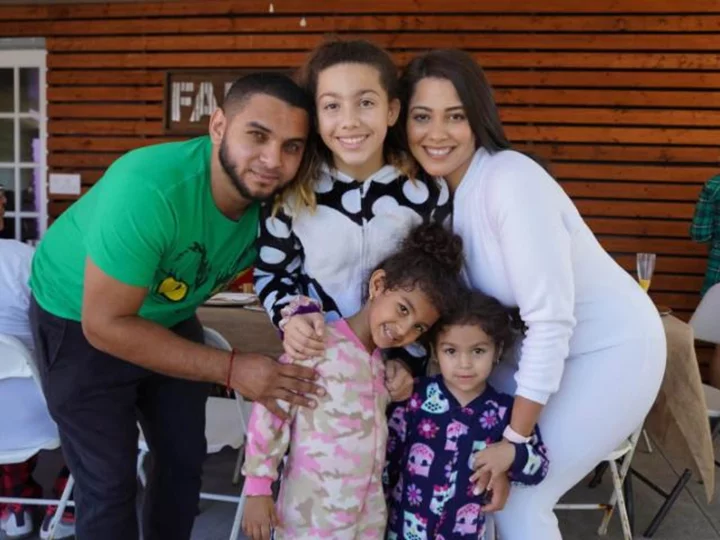Noelia Gutierrez was at home having dinner with her mother one evening in March of 2017 when she suddenly felt an agonizing headache. Then her body began shaking uncontrollably.
Guiterrez, a nurse who had given birth to a healthy baby girl eight days prior, said she couldn't move her legs or arms.
"I knew my body was telling me something is off," said Gutierrez. "I thought maybe I was having an allergic reaction."
In a panic, Gutierrez's mother, who primarily speaks Spanish, picked her up and laid her on the couch. Gutierrez was able to dial 911 on her cell phone but she could barely speak and only remembers slurring the word "help" repeatedly to the operator.
She said she fell unconscious shortly after that. A couple of days later, she woke up in the hospital to unbelievable news. At the age of 29, Gutierrez had experienced a stroke.
"My ignorance was like, 'I don't fit the criteria for this; this usually happens to older people,'" Gutierrez said.
But what Gutierrez didn't know at the time was that Hispanic adults in the United States, regardless of age, are at high risk of stroke, partly due to unmanaged risk factors such diabetes, high cholesterol and obesity, according to the American Heart Association. The association also points to limited access to health care in the Hispanic community and low health literacy rates as additional risk factors.
Gutierrez said it's unclear what caused her stroke. But she, like many Hispanic Americans, didn't know the warning signs.
"There's so little education in my community," Gutierrez said. "We don't really speak about those things."
But a new acronym aimed at Spanish-speakers hopes to break down language barriers and teach people the warning signs of a stroke in their native language.
On Sept. 14, the American Stroke Association -- a division of the American Heart Association -- launched Juntos Contra el Derrame Cerebral, a campaign to draw awareness to its Spanish acronym for recognizing stroke signs: R.Á.P.I.D.O.
The acronym uses the Spanish words rostro caído (face drooping), alteración del equilibrio (loss of balance), pérdida de fuerza en el brazo (arm weakness), impedimento visual repentino (sudden vision difficulty), dificultad para hablar (slurred speech) and obtén ayuda, llama al 911 (get help, call 911). The campaign is being promoted through public service announcements featuring Gutierrez and a 60-second Spanish jingle.
R.Á.P.I.D.O. translates to "fast" in English and mirrors the English-language stroke warning acronym F.A.S.T., which stands for face drooping, arm weakness, speech difficulty, time to call 911.
A survey conducted by the American Stroke Association found that only 39% of Hispanics were familiar with F.A.S.T. and just 42% could name two stroke warning signs without help.
Dr. José Biller, an American Stroke Association volunteer expert and professor and chair of neurology at Loyola University Chicago's Stritch School of Medicine, said it's important to be "culturally relevant" when educating the Hispanic community about health.
R.Á.P.I.D.O., Biller said, is an acronym that he believes most Hispanic adults can easily remember.
A stroke is a life-threatening medical emergency that happens when blood supply to part of the brain is cut off. Lack of symptom awareness, Biller said, could delay someone from calling 911 or going to a hospital.
"Every second counts," Biller said. "Someone who is well-informed will reach emergency services sooner."
Biller said he also wants to use the campaign to raise awareness of preventative measures for strokes. He is encouraging the Hispanic community to see a doctor for concerns about high blood pressure or irregular heartbeat, stop smoking, limit alcohol and get ample rest.
"Prevention is the key," Biller said.
Gutierrez, meanwhile, said since the stroke she often struggles with multitasking but otherwise lives a normal life working as a nurse and raising her three daughters.
She said she hopes that the campaign -- and sharing her experience -- encourages more people in the Hispanic community to take charge of their health. R.Á.P.I.D.O. is free and easy to comprehend, Gutierrez said
"You can practice at home, share it with your family and have everyone on board education-wise," Gutierrez said.
She had a message for the Hispanic community: "Listen to your bodies. This is what helps us provide for our families; this is our tool that we use for work. Ask those questions about your medical history and don't think 'this can't happen to me.'"

